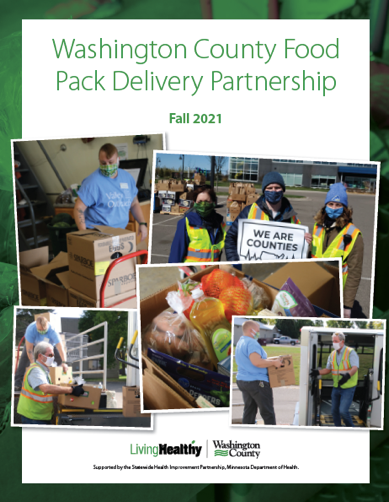
There have always been individuals and families who have struggled with food insecurity — and the pandemic has only increased those numbers. Whether due to job loss or lack of transportation, more people have had issues accessing high-quality, nutritious food during the last two years.
Washington County organized a food delivery program during the pandemic to help meet the increased need of residents for access to high-quality food. The program is made up of food shelves, transportation providers, and three county staff members. It has allowed residents to request free no-contact food deliveries to their homes since April 2020.
The Washington County food-pack delivery partnership includes the county, Valley Outreach, Christian Cupboard Emergency Food Shelf, White Bear Lake Emergency Food Shelf, Metropolitan Council-contracted Transit Link services, and nonprofit transportation provider Newtrax. The partnership is funded by the Minnesota Department of Health Statewide Health Improvement Partnership, Trellis, St. Croix Valley Foundation, the CARES Act, and others.
When residents need food delivered, they may call the county’s food support line, complete an online form, reach out via social media, or make a request through staff at a food shelf. The county forwards these orders to the food shelves for fulfillment and to transportation partners for delivery.
Washington County commissioned an evaluation of the food-pack delivery partnership, resulting in a report that summarizes its strengths, challenges, and participant experiences. One element that has worked very well is that every organization in the coalition was able to leverage their expertise and do what they do best. In particular, the county provided centralized support and technical expertise, food shelves provided food to people who need it, and transportation providers coordinated delivery routes to get the food to people’s doorsteps.
Other factors that have been crucial to the program’s success include:
- One organization, Washington County, acting as the main point of entry.
- Good communication between partners, enabling them to fulfill emergency food requests.
- Innovation. For example, transportation providers delivering food to people’s homes rather than driving people to food shelves, which happened pre-pandemic.
- Flexibility. For instance, food shelves serving those outside of their usual territories.
One of the main challenges of the program was a change in transportation partners. After six months, the capacity of Transit Link (the coalition’s original transportation partner) to deliver foods decreased as it resumed its traditional transportation services, so the county arranged with Newtrax to deliver food packs.
In a survey of the food-pack delivery partnership about the program, most participants had positive feedback about the process. Nine in ten survey respondents said requesting food was either easy (68%) or somewhat easy (22%). Participants cited delivery to their residence as the most important element of the program, and they also said they would appreciate more choice and customization in food-pack items.
Partner organizations believe the need for delivery will continue, even as the impact of COVID lessens. Survey respondents agreed: 78% said they would have used the delivery service if it had been available to them pre-pandemic, and 77% anticipate needing the delivery service moving forward.
Washington County has had a key role in the delivery-pack program from the beginning, and coalition partners are continuing the program. The county has transitioned its customer service and system management roles to local food shelves in the partnership for long-term sustainability of this important service.
Residents in Washington and Ramsey County may request a free food-pack delivery online at https://bit.ly/foodshelfdeliverymn or by calling 651-390-6507. Contact foodshelfdeliverymn@gmail.com with additional questions. This story map includes more data about the partnership from April 2020–October 2021.

